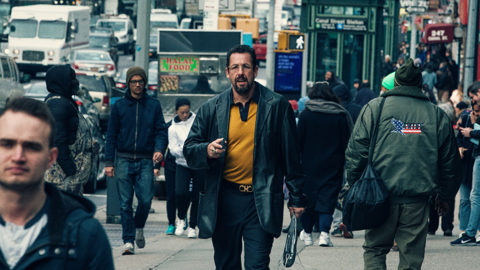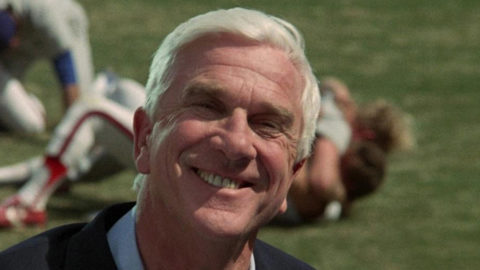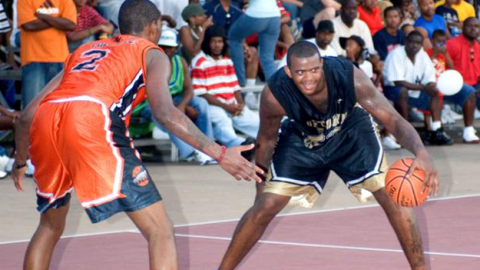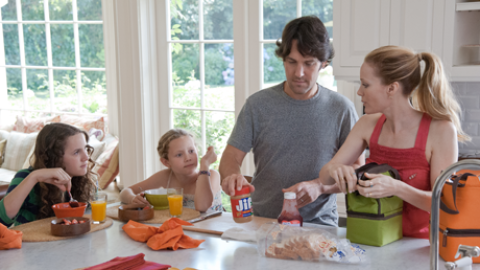Court Vision
This article appeared in the September 9 edition of The Film Comment Letter, our free weekly newsletter featuring original film criticism and writing. Sign up for the Letter here.
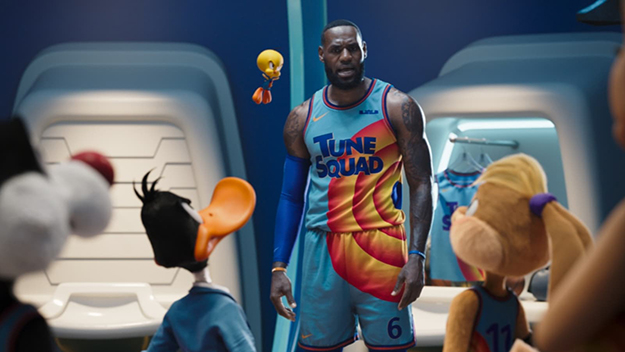
Space Jam: A New Legacy (Malcolm D. Lee, 2021)
Early on in his commercial career, Michael Jordan seemed to grasp that he was best served by playing the straight man. Starting with the Spike Lee–directed Air Jordan ad campaigns in the late ’80s, Jordan’s screen presence has amounted to simply looking amazing at basketball and occasionally smirking while Lee’s Mars Blackmon acts as a relentless hype man. Space Jam (1996), directed by longtime commercial and music video director Joe Pytka, is essentially an extended advertisement for Jordan and Looney Tunes. The movie is packed with real-life celebrities and animated cartoon characters, from Charles Barkley and Bill Murray to Bugs Bunny and Daffy Duck, who provide era-appropriate pop culture references while Jordan simply floats across the screen holding a basketball. MJ knew his limitations as an actor. Why try to stretch himself into something he was not, when he was universally beloved for just being himself?
While the first Space Jam was never more than a slick product designed to sell merchandise, the recent sequel, Space Jam: A New Legacy, starring LeBron James, is somehow even less compelling. LeBron, a much more polarizing cultural figure than Jordan, would have been well-advised to follow MJ’s playbook and center the film around his strengths as a performer. Where Jordan was a blank slate who allowed fans to project themselves onto him, LeBron’s larger-than-life celebrity has seen its ebbs and flows, from hero to villain and back to hero, since his emergence as a high-school phenom. But none of these complexities—the “love him or hate him” narratives that have defined his public life; his season-to-season superstitions, like going dark on social media during the playoffs—are present in the empty-calorie leftovers of Space Jam: A New Legacy. The film is a misfire for many reasons, but not tapping into LeBron James’s legitimate screen presence is its biggest sin. It’s unfathomable why its leading star, who had been attached to the project since 2014, just accepted this cluttered mess as the final product. With Space Jam, Jordan gave us a bluntly honest autobiographical text about his failed foray into minor-league baseball and needing the sport as much as the sport needed him. In the new film, LeBron is presented to moviegoers as a bemused dad who does not understand his son’s love of e-sports at first, but eventually learns to stop worrying and love video games—and all Warner Bros. intellectual properties along the way. (This past June, LeBron’s real- life son, Bronny James, graced the cover of Sports Illustrated as one of the teen ambassadors for the e-sports company FaZe Clan, which makes the film’s premise feel even more like force-fed corporate synergy.)
Nobody would expect a Kevin Garnett-in-Uncut Gems level of performance in Space Jam: A New Legacy, but there are other recent examples of athletes succeeding as leads in major studio films. In 2018, LeBron’s former teammate Kyrie Irving starred in Uncle Drew, a feature film adapted from a series of Pepsi ads about a geriatric street ball legend. Irving is a mercurial but talented enigma as a basketball player, and he does some transformative character work in the film, building on the tradition of broad studio comedies with relative ease. Even when buried in heavy prosthetics, Irving thrives in this alter ego, making an effective switch from his on-the-court avatar. There’s also LeBron’s own appearance in Judd Apatow’s Trainwreck (2015) as an exaggerated version of himself. LeBron showed some promising comedic chops in the film, even if he was still miles away from the sky-high athlete-turned-actor bar set by Kareem Abdul-Jabbar’s deadpan turn as co-pilot Roger Murdock in Airplane! (1980). Apatow, who cut his teeth in the ’90sas a writer-producer on The Larry Sanders Show, was the perfect guide for LeBron to dip his toes into Hollywood.
What remains LeBron’s best and most enduring onscreen appearance is actually in Lenny Cooke (2013). Josh and Benny Safdie’s documentary is a portrait of Cooke, a former high-school basketball star with obvious, raw talent, who, due to a series of poor decisions and the influence of various figures in his life with ulterior motives, fails in his quest to make it to the NBA. LeBron (along with Carmelo Anthony) appears halfway through the film in archival footage from a 2001 national showcase for high-school talents. Watching LeBron next to Cooke, with the knowledge that one is destined for glory and the other for obscurity, is as devastating as the scene in Inside Llewyn Davis when the title character first encounters Bob Dylan. Lenny Cooke shows that perhaps the best use of LeBron is placing him on the periphery of a story rather than at its center and letting his talents do the talking, as in Michael Jordan’s screen appearances. The elusive mystique of that kind of greatness is its star quality.
Space Jam: A New Legacy centers LeBron but without that essential mystique. Onscreen he is an exasperated father of three, showing his age—and making anyone who’s watched him from the start of his career feel old—with his resistance to a changing sports and media landscape. His career-defining plays and athletic feats of genius are nowhere to be found. Instead, one of our most charismatic professional athletes is transformed into just another element of Warner Bros franchise IP, among the many on parade here. The movie robs us of the emotional thrill of watching LeBron play and vacuums up his charisma, which, love him or hate him, he has in spades on the basketball court.
Caden Mark Gardner is a freelance film critic from Upstate New York. His work has appeared in Criterion, Hyperallergic, MUBI, Film Comment, Reverse Shot, and other outlets.



